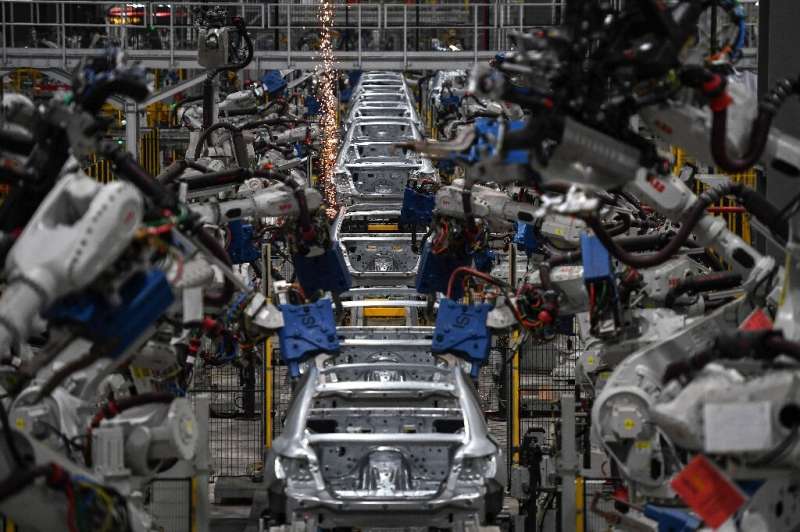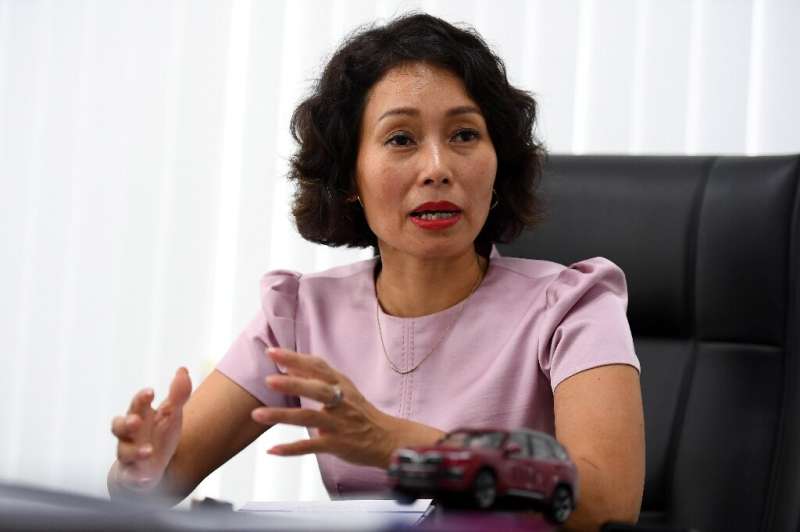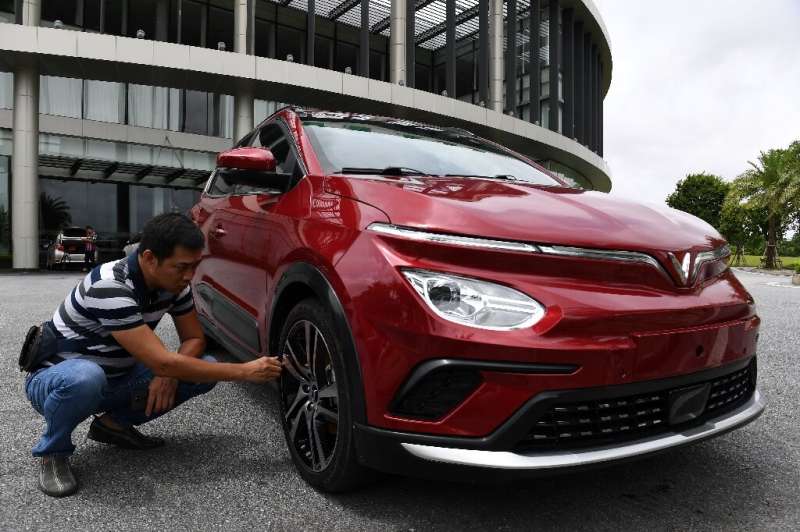Vietnam's VinFast targets US market in 'preposterously hard' gamble

Having conquered most industries at home, optimistic chiefs at conglomerate Vingroup are setting their sights much higher as they ramp up plans to sell the first ever Vietnamese car in the mighty US market.
The pivot is a bold move by chairman Pham Nhat Vuong—Vietnam's richest man—who started out selling dried noodles in the former Soviet Union before amassing his $5 billion fortune in a range of sectors including real estate, tourism and education.
His firm's auto unit VinFast already has electric vehicles (EVs) on the streets of Hanoi, though the attraction of the lucrative United States market is too good to ignore.
However, the firm admits that competing in the crowded and difficult US market, which is dominated by Tesla, will be a huge but worthwhile task.
"If we can make it there, we can make it anywhere," CEO Le Thi Thu Thuy told AFP from the factory site where the finishing touches were being made to the VF8, a mid-size SUV with a sleek design by Italy's Pininfarina, which worked with Ferrari for decades.
But, she added, "we want to show people who might not have the correct understanding of Vietnam that Vietnam today is quite different to Vietnam during the war, or even to Vietnam 10 years ago".
While the aim of getting Americans driving its cars by Christmas may seem a huge ask, Vingroup—Vietnam's biggest private firm—has a track record of delivering.
Within two years, Pham transformed a muddy patch of swampland near the northern port city of Haiphong into a state-of-the-art factory—complete with 1,200 robots, German, Japanese and Swedish machinery, and a global team from auto giants including BMW and General Motors.
Public scepticism
The company has already invested heavily in its American dream.

In July, VinFast opened six showrooms in California, including a flagship store at one of the trendiest malls in upmarket Santa Monica, though for now it is only taking orders as vehicles are not yet available.
It plans 30 in total by the end of the year, while it has also broken ground on a $2 billion electric vehicle and battery plant in North Carolina that it says will produce 150,000 cars a year when it is fully up and running.
The factory aims to create more than 7,000 new jobs, prompting US President Joe Biden himself to tweet the announcement back in March.
"I always joke that he is the best salesperson we have," says Thuy.
But the American public will likely be far more sceptical, said Karl Brauer, a Los Angeles-based analyst with iSeeCars.com, a vehicle comparison site.
"It's been typical for it to take a couple of decades for brand new automakers to the US market to become ingrained," he said, referencing South Korea's Hyundai and Kia, which struggled through the 90s and early 2000s.
They are now among the most popular car makers in the United States.
Americans' perception may be "this is some unheard-of-brand I've never had any experience with, and I'm not sure I have any faith in the quality", he added.
Push into Europe
To hook customers, VinFast is pushing a highly unusual monthly battery-leasing model for the two cars headed to the United States—the VF8 and VF9—lowering the cost of the upfront payment to $42,000 and $57,500 respectively. Tesla's SUVs start at around $65,000.

Once the battery life goes down to 70 percent, VinFast replaces it for free, and aims to repurpose or recycle the old one.
"The theory behind that is we're giving you a vehicle that is priced similarly to an internal combustion engine vehicle," Thuy explained.
The scale of VinFast's ambition, which extends to Europe, where they plan to open the first of 20 showrooms by the end of the year, has stunned many in the business.
"It is preposterously hard to build a car and sell it, at least to a global audience, as seems to be the ambitions of VinFast," said Matthew Degen, senior editor at Kelley Blue Book, a car shopping and research site.
"It usually takes years and years to get a car from a design on paper into something that's in your hands and you're actually driving it."
However, VinFast developed three cars in just 21 months.
And although the regular car market is already saturated, he says, there may be a "brief window" for them to make their mark in the still developing electric vehicle sector.
For Brauer, VinFast's success will largely come down to millennials.
They will "have trouble with people over 50 years old... but younger consumers in this country are getting more and more open to new vehicles".
© 2022 AFP





















